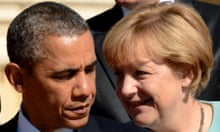The French government summoned the US ambassador in Paris on Monday to demand an urgent explanation over claims that the National Security Agency had engaged in widespread phone and internet surveillance of French citizens.
The French daily Le Monde published details from the NSA whistleblower Edward Snowden suggesting the US agency had been intercepting French phone traffic on what it termed "a massive scale".
Le Monde said more than 70m French phone calls had been recorded in one 30-day period late last year. Techniques included the automatic recording of conversations from certain numbers, and sweeping up text messages based on keywords. The paper warned that the interceptions were likely to have targeted not just those with suspected terrorist links but also people in business, politics and the French administration.
The French prime minister, Jean-Marc Ayrault, said he was shocked and demanded the US provide "clear answers, justifying the reasons these practices were used and above all creating the conditions of transparency so these practices can be put to an end".
Asked if France should be directly voicing its concerns to Barack Obama, Ayrault said it was up to the French president, François Hollande, to take any action, but "clearly there must be measures and they will be taken".
The White House responded by saying that the US "gathers foreign intelligence of the type gathered by all nations".
Caitlin Hayden, spokeswoman for the National Security Council at the White House, said: "We've begun to review the way that we gather intelligence, so that we properly balance the legitimate security concerns of our citizens and allies with the privacy concerns that all people share."
The claims were published as John Kerry, the US secretary of state, arrived in Paris for the start of a European tour to discuss the Middle East, especially Syria, and keen to stress close military and intelligence ties with Paris, which Kerry recently called the "oldest ally" of the US.
Laurent Fabius, French foreign minister, is due to meet Kerry on Tuesday to discuss Syria, but a French official said the NSA question would also be raised. Fabius warned: "This sort of practice between partners that invades privacy is totally unacceptable and we have to make sure, very quickly, that this no longer happens."
Fabius added: "We co-operate in a useful way in the fight against terrorism, but that does not justify everything."
The US ambassador, Charles Rivkin, was summoned to the French foreign ministry hours after Le Monde's investigation was published on Monday morning .
A French official said Rivkin was met by the ministry's head of staff, who reminded the US "that these types of practices between partners are totally unacceptable and we must be assured that they are no longer happening". The French demanded that Washington provide a full explanation "and tangible response to our concerns as soon as possible".
Marie Harf, deputy spokesperson at the state department, said the US was keen to ensure that press reports of "alleged intelligence activities" would not damage relations with France and other countries.
The reports in Le Monde, which were co-written by the outgoing Guardian journalist Glenn Greenwald – who worked with Snowden to lay bare the extent of the NSA's actions – claimed that between 10 December 2012 and 8 January 2013 the NSA recorded 70.3m phone calls in France.
According to the paper, the documents show that the NSA was allegedly targeting not only terrorist suspects but also politicians, businesspeople and members of the administration under a programme codenamed US-985D. The paper said "French interests" were "targeted on a daily basis".
Le Monde highlighted what it called "techniques used to violate the secrets or simply the private life of French people". The paper said: "The agency has several collection methods. When certain French phone numbers are dialled, a signal is activated that triggers the automatic recording of certain conversations. This surveillance also recovered SMS and content based on keywords."
Such methods, it added, allowed the NSA to keep a systematic record of the history of each target's connections. Le Monde said the unpublished Snowden documents it had seen showed "intrusion, on a vast scale, both into the private space of French citizens as well as into the secrets of major national firms".
The most recent documents cited by Le Monde, dated April 2013, indicated the NSA's interest in email addresses linked to Wanadoo, once part of France Telecom. About 4.5 million people still use wanadoo.fr email addresses in France. Also targeted was Alcatel-Lucent, a French-American telecoms company that employs more than 70,000 people and works in the sensitive sector of equipping communication networks.
One of the documents instructed analysts to draw not only from the electronic surveillance programme, but also from another initiative dubbed Upstream, which allows surveillance on undersea communications cables.
Le Monde said one document it consulted showed that between 8 February and 8 March 2013 the NSA collected, worldwide, 124.8bn telephone data items and 97.1bn computer data items. In Europe, only Germany and the UK exceeded France in terms of the numbers of interceptions.
Le Monde questioned why the French government had remained so discreet for months on the NSA question, compared with the tougher stance shown by Brazil and Germany.
In July Hollande threatened to suspend negotiations for a transatlantic free trade agreement after reports in the Guardian and Der Spiegel that the NSA spied on EU offices and European diplomatic missions in Washington and at the UN in New York.
"We were warned in June [about the programme] and we reacted strongly but obviously we need to go further," Fabius said. Also in July, Le Monde reported that France runs its own vast electronic surveillance operation, intercepting and stocking data from citizens' phone and internet activity, using similar methods to the NSA's Prism programme.







Comments (…)
Sign in or create your Guardian account to join the discussion